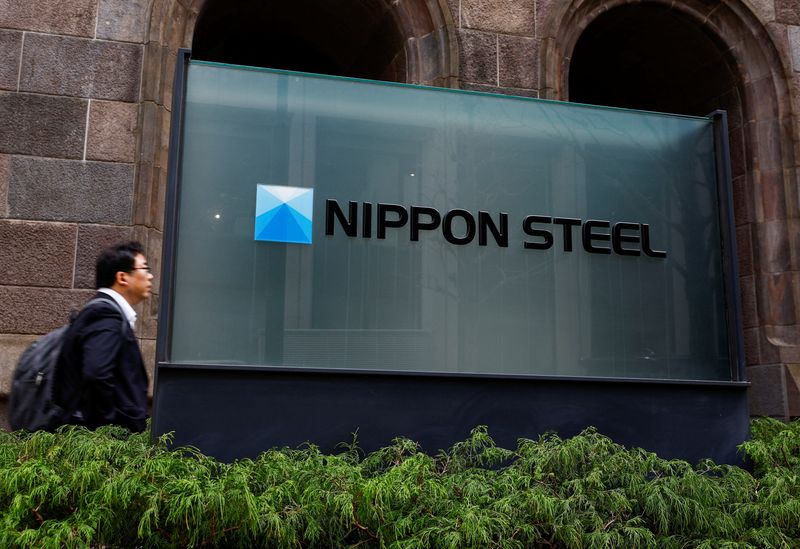By Alexandra Alper
WASHINGTON (Reuters) -Nippon Metal’s proposed $14.9 billion takeover of U.S. Metal would create nationwide safety dangers as a result of it may harm the provision of metal wanted for vital transportation, development and agriculture tasks, the U.S. stated in a letter despatched to the businesses and seen by Reuters.
The letter additionally cited a worldwide glut of low cost Chinese language metal, and stated that underneath Nippon, a Japanese firm, U.S. Metal could be much less prone to search tariffs on international metal importers.
The Committee on Overseas Funding within the U.S. (CFIUS) stated in its 17-page letter despatched on Saturday to Nippon Metal and U.S. Metal, and first reported by Reuters, that selections by Nippon may “lead to a reduction in domestic steel production capacity.”
CFIUS added: “While U.S. Steel frequently petitions for (trade) relief, Nippon Steel features prominently as a foreign respondent resisting trade relief for the U.S. domestic steel industry.”
The letter offered a primary glimpse of the nationwide safety grounds that the Biden administration may use as a foundation for its anticipated transfer to dam the merger, at the same time as the businesses and plenty of trade consultants questioned the energy of the arguments.
“By almost any measure, the issues identified by the committee are not ones that would fall into the national security bucket, but quite clearly into two others: Nationalistic trade protectionism and electoral politics,” stated Michael Leiter, a CFIUS lawyer in Washington, D.C. not concerned within the deal.
If the federal government is “truly worried about maintaining steel supply here in the United States, the real solution is not to block this deal, but instead to use the CFIUS hammer to ensure that Nippon Steel makes and maintains such investments,” he added.
The deal has change into a political sizzling potato, with many Republican and Democratic lawmakers voicing opposition to it. Vice President and Democratic presidential candidate Kamala Harris stated on Monday at a rally in Pennsylvania, the swing state the place U.S. Metal is headquartered, that she needs U.S. Metal to stay “American owned and operated.” Her Republican rival Donald Trump has pledged to dam the deal if elected.
China looms giant within the background of the commerce considerations described by CFIUS. In accordance with the committee, China’s “persistent use of market-distorting government interventions” has allowed the nation to unfairly acquire dominance within the international metal market, because it exports in depth surplus metal that artificially lowers worldwide costs.
It additionally cited 2022 knowledge that confirmed China produced about 54% of whole international crude metal and was the biggest exporter.
In a 100-page response letter seen by Reuters and despatched on Tuesday, Nippon Metal stated it would make investments billions of {dollars} to take care of and increase U.S. Metal services that in any other case would have been idled, “indisputably” permitting it to “maintain and potentially increase domestic steelmaking capacity in the United States.”
Nippon additionally reaffirmed a promise to not switch any U.S. Metal manufacturing capability or jobs outdoors the U.S. and wouldn’t intervene in any of U.S. Metal’s selections on commerce issues, together with selections to pursue commerce measures underneath U.S. legislation in opposition to unfair commerce practices.
The deal, Nippon added, would “create a stronger global competitor to China grounded in the close relationship between U.S. and Japan.”
Nippon even proposed a nationwide safety settlement, geared toward assuaging CFIUS considerations, with pledges {that a} majority of U.S. Metal’s board of administrators could be non-dual U.S. residents, together with three unbiased administrators accredited by CFIUS to supervise compliance with the settlement.
“Nippon is throwing a financial lifeline to U.S. Steel while allowing it to remain led and managed by U.S. persons with government oversight,” stated Nicholas Klein, a CFIUS lawyer with DLA Piper. “I would think that CFIUS could mitigate the risk of reduction in steel production capacity through supply assurance and other common mitigation measures.”

The committee, which opinions international investments for nationwide safety threats, additionally sees danger arising from Nippon’s rising presence in India, the place manufacturing prices are a lot decrease than within the U.S.
“Nippon Steel has no economic incentive to, and will not, import Indian-origin…steel into the United States to compete with or undermine U.S. Steel, which would directly contradict the basis for Nippon Steel’s multi-billion dollar investment,” the businesses countered of their Tuesday letter.




